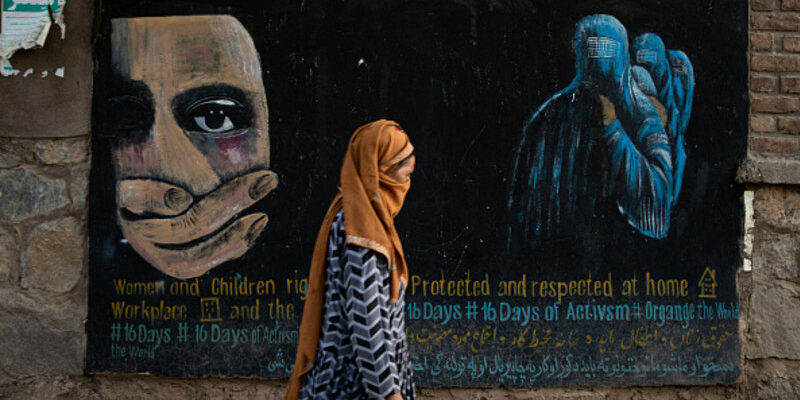Save articles for later
Add articles to your saved list and come back to them any time.
When the Taliban seized power in Afghanistan two years ago, Ameena was shattered that girls were no longer allowed to study at high school.
“Things were so different,” she said on a scratchy WhatsApp call from Kabul. “I felt hopeless. I thought that was the end; that we didn’t have anything left to do.
A woman walks past a mural calling for women and children’s rights in Afghanistan.Credit: Nava Jamshidi/Getty Images
“I thought of killing myself. But as time has passed, I’ve realised that no-one can stop your learning.”
Ameena, whose name has been changed because of the danger if she were to be identified, has found a way to study even at the risk of punishment by Taliban hardliners. She and about 25 other teenage girls and young women are members of an underground book club.
The 19-year-old said they meet at a different school every Thursday to read books, help each other with difficult passages and discuss ideas.
It has allowed her to dream of having a career despite women’s rights being brutally wound back in Afghanistan.
Authorities have made head-to-toe clothing mandatory, decreed that women cannot travel beyond short distances without being accompanied by a close male relative and banned them from secondary schools, universities, jobs at aid organisations, libraries, public parks, gyms, swimming pools and beauty salons.
Families are reportedly forcing more girls into early marriages because they cannot get an education or a job.
But the resourceful Ameena goes online to give free English lessons to almost 1000 girls, teaches classes in digital marketing and graphic design, and studies for a bachelor of business administration at the American University of the People.
“My great ambition is to become a businesswoman and to provide education for Afghan women and other ones that are not able to continue their education,” she said in exemplary English that she has learnt from books and YouTube videos in the past three years.
But such are the risks for young women that Ameena has not even told her protective father what she does on Thursdays.
Australian-based non-profit organisation World Literacy Foundation is working to supply e-books to the estimated 3000 Afghans who rely on these secret meetings to keep learning.
“Access to books is absolutely vital for their growth in imagination, curiosity and education,” said chief executive Andrew Kay, who started the foundation in 2011. “They’re really restricted in their choice of books, so we’re hoping to open up the floodgates.”
Kay said the rise of underground book clubs showed the spirit of Afghan girls in a hostile environment. Supplying e-books helped them feel supported by an international community rather than isolated in their own country.
Ameena, who is an ambassador for the foundation in Kabul, loves reading as much as many teenagers in wealthier countries.
“It’s unexplainable how you feel reading your favourite book,” she said. “Whenever I’m reading, I just lose myself and forget about the world around me and just focus on the book. I can’t even hear people talking around me.”
While Ameena would love more novels, self-improvement has been driving her reading lately. She is currently enjoying The Psychology of Money, and her all-time favourite book is Atomic Habits, which she has read four times.
“I’m the kind of person that doesn’t let anyone stop me from education,” she said. “I teach online, I study online. I don’t let them stop me.”
Lifeline 131 114.
Email Garry Maddox at [email protected] and follow him on Twitter at @gmaddox.
Find out the next TV, streaming series and movies to add to your must-sees. Get The Watchlist delivered every Thursday.
Most Viewed in Culture
From our partners
Source: Read Full Article

